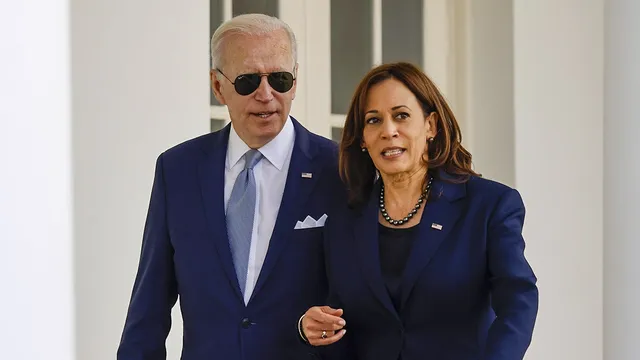
Barack Obama doubts Kamala Harris's chances for Democratic nomination
2025-04-05 07:00- Following Joe Biden's withdrawal from the 2024 race, Barack Obama expressed doubts about Kamala Harris's ability to win the Democratic nomination.
- Obama hesitated to endorse Harris and suggested advocating for an open primary instead.
- These dynamics contributed to tensions within the Democratic Party as Harris sought to assert her candidacy.
Express your sentiment!
Insights
In the context of the 2024 presidential race, following President Joe Biden's decision to withdraw from the electoral battle, tensions arose due to the actions of former President Barack Obama. Reports indicate that Obama was not in favor of Kamala Harris taking over the Democratic nomination. He publicly hesitated to endorse her and privately expressed doubts about her viability as a candidate. Instead, he supported the idea of an open primary to identify a potentially stronger nominee. This situation created an uncomfortable rift as Harris, feeling undermined by Obama, sought his endorsement while struggling to consolidate support from other Democratic leaders. The events unfolded rapidly after Biden's exit from the race. Harris was reportedly blindsided by the political landscape, which had shifted overnight, creating uncertainty about her candidacy. Obama’s reservations became a focal point of discussion among political insiders. His advocacy for an open primary and reluctance to support Harris until several days post-Biden's withdrawal further fueled the narrative of animosity within the party. Harris's frustration grew as she sought to solidify her position, aiming to rally key allies and donors while navigating the fallout from Biden’s departure. Meanwhile, the overall sentiment within the Democratic Party was one of division, with several influential figures echoing Obama’s skepticism regarding Harris’s electability against the expected Republican nominee, Donald Trump. Nancy Pelosi, too, showed reluctance about the nomination process, indicating worries about Harris directly succeeding Biden. This led to accusations that Harris was being undermined by party elites fearful of a less favorable candidate vying for the presidency. The authors Jonathan Allen and Amie Parnes chronicle these events in their book, providing an in-depth view of the behind-the-scenes struggles during this pivotal moment. As the pressure mounted, Biden maintained expectations for Harris to uphold loyalty to his administration’s policies during her campaign, limiting her ability to craft a distinct identity. The culmination of these events highlighted a significant crossroads for the Democratic Party, underscoring the challenges of leadership, loyalty, and public perception as the 2024 campaign season commenced. With various factions within the party at odds, the road to securing the nomination proved fraught with hurdles, reflecting the broader divides present in contemporary American politics.
Contexts
The Democratic Party nomination process is a multifaceted event designed to select the party's candidate for the presidency. This process typically unfolds during an election cycle and consists of several steps, including primaries and caucuses, which are crucial in determining delegates who will support candidates at the national convention. Each state holds its own primary or caucus, and the method of voting can vary significantly from one state to another, influencing the outcome of the nomination process. The accumulation of delegates is critical, as a candidate must secure a majority of delegates to win the nomination. The specific number of delegates required can be influenced by factors such as party rules and the number of states participating in the process. Primaries can be open, closed, or semi-closed. In open primaries, voters can participate regardless of their party affiliation, while closed primaries require voters to be registered party members to vote. This impacts voter turnout and engagement since independents may feel disenfranchised in closed systems. Caucuses, on the other hand, involve local gatherings where party members discuss and vote on their preferred candidates. This can lead to a more dynamic interaction among supporters, although it may also pose logistical challenges that affect participation rates. Following the completion of the primaries and caucuses, the Democratic National Convention plays a pivotal role in formalizing the nominee. Delegates representing the various states cast their votes to determine the official candidate, and this event often serves to unify the party before the general election. The convention also includes speeches and presentations to articulate the party’s platform and energize the base. Once nominated, the candidate typically selects a running mate, often referred to as the vice-presidential nominee, which can be a strategic choice to appeal to different voter demographics or to bolster electoral strength. The nomination process ultimately aims to reflect the will of the party’s electorate while balancing the need for broad appeal in the general election. While the process can be competitive and at times contentious, it serves as a critical mechanism for democratic representation within the party. As candidates vie for delegates and votes, the nomination process becomes a microcosm of party dynamics and voter priorities, illustrating the complexities of American political life.